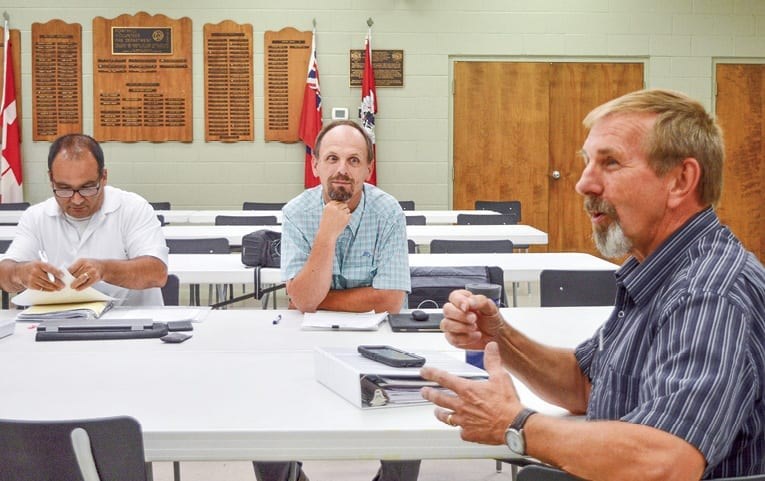In a recent issue of the Voice, the work of Pelham bylaw officers in the enforcement of local cannabis odour regulations, using a high-tech device called the Nasal Ranger, was documented.
Building on that report, Cannabis Control Committee (CCC) Chairman Tim Nohara spoke with the newspaper about the next steps in the committee’s work. His public commentary, appearing this issue on page 4, details how residents can file online odour complaints.
The public complaints component of the cannabis bylaw leads to certain enforcement protocols and actions, said Nohara, triggering Town of Pelham bylaw officers to issue $250 fines under the Administrative Monetary Penalty System, or AMPS, where warranted. The Contractor Monitoring Program, to be designed and implemented by the CCC in conjunction with consultants, will involve an independent contractor. The contractor will use a different methodology for measuring odour, and the results will be available on a website for all to see. The costs of the Contractor Monitoring Program would be funded by the cannabis industry, according to the bylaw, and fines would be much greater than those administered under AMPS.
Pelham’s Odorous Industries Nuisance Bylaw, passed in March, applies to existing cannabis operations, as well as new cannabis facilities.
“That's a key feature, because not all the tools in our toolbox apply to existing cannabis,” said Nohara.
“What we have talked about in the months leading up to the end of July was the Official Plan Amendment and the Zoning Bylaw Amendment,” said Nohara. “Looking forward, we have another bylaw that’s in draft form, dealing with light pollution. We've had issues in the Town with odour and light related to cannabis, and we are treating them separately.”
The light bylaw, which will be broad, will be on the committee’s fall/winter agenda. Referred to as “Dark Skies,” the bylaw will emphasize the reduction of light pollution and preserving the night sky.
Cannabis producer Redecan (located on Foss Road) has already taken steps to address the light issue by installing horizontal night curtains that are like an awning, basically acting as night shades.
There have not been complaints about light pollution from CannTrust recently, said Nohara, but that's because the Fenwick facility was essentially shut down for over a year when their operation license was suspended. The license has since been restored, and unless CannTrust installs something similar to what Redecan has implemented, one can expect to see sky-glow above Highway 20 and Balfour once again.
Outdoor cannabis cultivation of an industrial scale is a new concern for Pelham.
“We haven't had a problem with outdoor grows because, until now, they weren’t located here,” said Nohara. “We had an interim control bylaw that is still in play because of the appeals by cannabis growers. It should have expired in July, but because of the appeals, it's still in play.”
Outdoor grows are governed under Cannabis Act regulations. They were meant to be small operations to support the medicinal cannabis requirements of individuals with health issues. If a person had a prescription, they could designate someone to grow the cannabis for them.
Nohara said that at the CCC’s meeting on September 30, priorities were established.
“Finishing the implementation of the odour bylaw and the contractor monitoring is the first item,” he said. “The second is to complete the cannabis light pollution law, and the third is to develop a resident’s guide to cannabis regulation, which provides information in layman’s terms for the community.”
In accordance with Pelham’s Official Plan amendments, if a grower wants to build a new indoor facility, there is a public process. The proposal would require a number of studies and ultimately a zoning bylaw amendment in order for a grower to be allowed to develop a new indoor facility.
“Outdoor is different,” said Nohara. “We recognized the cultivation of cannabis as an agricultural crop. You can grow outdoor without requiring a zoning bylaw amendment, but the committee did establish regulations or standards for outdoor cannabis in the zoning bylaws. One of the requirements is that an outdoor grow has to be set back 300 metres from the nearest sensitive area.”
The problem is that odour can travel great distances outdoors, driven by the prevailing westerly winds…certainly much farther than 300 metres.
Positioning of an industrial crop will influence how odour affects neighbouring areas, and so it’s necessary for the grower to have some awareness in terms of wanting to mitigate any adverse effects.
Nohara said that the Committee was told there is a two-week period which constitutes the plant’s flowering stage, which is the peak time for release of odour.
Nohara said that in the initial stages of the CCC’s work last year, they spent many months focused just on research. Different communities in Ontario took different approaches to cannabis control, but no precedents were established.
“Pelham is really the precedent-setting community, because we now have bylaws that are being appealed by the growers in court,” said Nohara.



